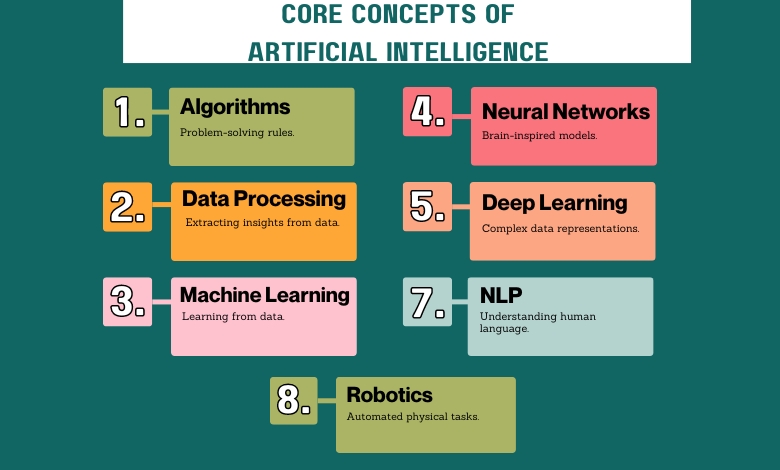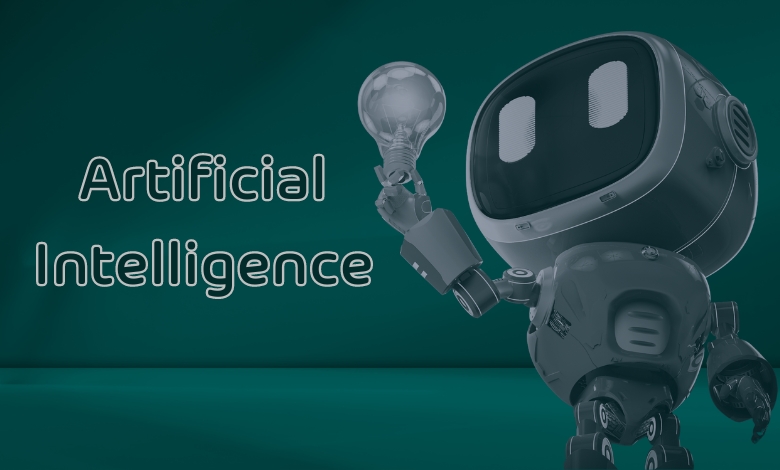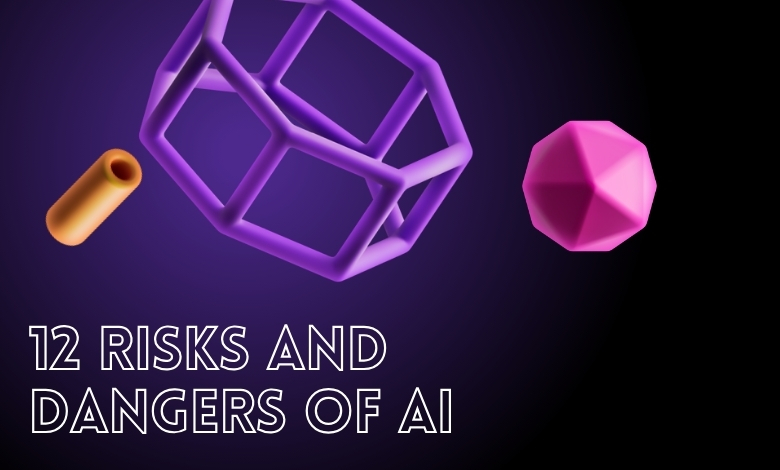What is Artificial Intelligence: Learn how AI is simulating human thought, making autonomous decisions, and providing support in various disciplines.
Artificial Intelligence (AI) — a technology engineered to mirror human cognition, carry out independent decisions, and provide support to humans across an extensive range of sectors. Delve into its fundamentals to understand its core.
Let me share a bit about AI, drawing from my own journey, touching on the essentials, its transformative role across sectors, the ethical dilemmas we face, and what the horizon might hold. This is an invite to use AI to make your business better together.
So, let’s dive in without delay.
Article Breakdown
What Really Is Artificial Intelligence (AI)?
Picture artificial intelligence as machines quickly learning to act more like humans. They’re learning, solving puzzles, recognizing patterns, and making decisions, pretty much like us. Essentially, a machine doing stuff that usually needs a human touch, like learning from bumps in the road, spotting trends, and making calls on the fly.
I caught an interview with Elon Musk on CNBC where he painted a pretty awesome picture of AI’s future. He’s all in on AI freeing us up from most jobs, picturing a world where we work just because we love it. Musk envisions AI taking the heavy lifting off our shoulders, opening up endless time for creativity.
The Basics of Artificial Intelligence
Artificial Intelligence, or AI, is like that assistant who always has the right answer. Imagine machines acting and thinking kind of like us – Interesting concept, right? Jumping into AI is like stepping into a new adventure, and I’m here to guide you through, just like a good buddy.
Getting the basics of AI is crucial, like learning how to drive before hitting the road. Trust me, once you’re in on it, things start to get super exciting.
What is the historical background of artificial intelligence?
Way back in ancient Greece, people were already thinking up robots, starting our long love affair with what we call artificial intelligence today. But it took ages for “AI” to become the hot topic it is now.
Then Alan Turing, a super smart British mathematician, came along. He suggested the idea of a “universal machine” – not just any machine, but one that could do any job you programmed it for. Think of it as the foundation for all the computer magic and AI stuff we have now.
Jump to the late 1960s, or what I like to call the golden age of AI research. It was an amazing time with lots of breakthroughs in solving problems, understanding language, and even in robotics. This era wasn’t just a chapter in history; it was a sneak peek into AI’s future, setting the scene for all the cool stuff we see now.
Core Concepts of Artificial Intelligence

Let me break down core concepts in artificial intelligence:
- Algorithms are like cooking recipes. They’re the reason Netflix knows exactly what show you want to watch next by looking at what you’ve watched before. It’s cool how these steps can solve big problems.
- Data Processing is like digging for treasure. From my experience, it’s about turning all that raw information into valuable insights. Imagine knowing exactly what sells best in your store and who’s buying it – that info is gold, helping you stock up wisely and make more money.
- Machine Learning (ML) is like teaching your computer to predict the future, but without magic. Doctors use ML to predict diseases and choose treatments. It’s like watching a plant grow by feeding it data and seeing the predictions it makes.
- Neural Networks remind me of the smartest kids in class, but for computers, inspired by our brains. They’re great at spotting patterns, like predicting stock market trends, which is super helpful for financial experts.
- Deep Learning, a special part of ML, is the magic that teaches computers to see and hear. It’s what lets self-driving cars recognize stop signs and avoid things in their way. This technology is like a glimpse into the future.
- Natural Language Processing (NLP) helps us talk to machines. Ever chatted with a customer service bot? That’s NLP at work. It makes life easier for businesses and customers by making conversations smoother.
- Robotics turns the sci-fi dreams of the past into today’s reality. Robots working by themselves in factories have made things faster and safer. It’s amazing to see machines doing jobs, giving us more time for creative work.
Risks and Dangers of Artificial Intelligence
Dealing with Bias and Fairness
You know, AI is like a mirror that shows the biases in the data we feed it. This really shows we need to face these biases directly. From what I’ve seen, trying hard to get rid of bias isn’t just about being fair; it’s about making AI a force for good, one that helps everyone equally. Believe me, making AI fair is tough, but the effort is totally worth it when we reach a place where AI treats everyone fairly.
Managing Privacy Issues
Privacy and AI? It’s complicated. My experience has shown me how AI can dig through data, which is both awesome and a bit worrying. Finding the right balance between using AI and keeping our personal lives private is tricky. I’m working with tech folks and lawmakers to make our digital lives more secure. It’s all about building a strong defense for our data, ensuring we’re safe in a world filled with AI.
Addressing Job Displacement
With AI on the rise, the fear of losing jobs is real, something I’ve seen many face. But there’s hope – learning new skills. It’s like starting a new chapter where we get ready for the future. I’ve seen people become empowered by this change. By getting ready for what’s coming, we’re not just getting by; we’re doing great.
Making Sure There’s Accountability
In the AI world, figuring out who’s responsible when things go wrong is a big deal. From what I’ve seen, it’s super important to make sure AI follows ethical rules. It’s about building a world where AI is not just smart but also does the right thing. All the discussions and debates are about setting up rules to keep AI on track. It’s a journey to make AI responsible, ethical, and beneficial for everyone.
For a deeper grasp of AI risks, refer to our dedicated guide that comprehensively explores the potential dangers and risks associated with AI.
Note: To enhance defense against AI progress, we’ve outlined 8 essential steps to safeguard yourself from its impact.
AI Enhancing Various Sectors for Improved Outcomes
Healthcare
Diving into AI in healthcare has been a wild ride. Imagine finding diseases with great accuracy, getting treatments that feel tailor-made, and discovering new cures super fast. It’s happening now and it’s changing how we take care of patients big time. I’ve seen it lead to spot-on diagnoses, super fitting treatments, and faster paths to new medicines. This change is huge—it’s really shaking up how we think about health and healing.
Finance
The finance world is getting a major boost from AI. Catching fraud feels like finding a needle in a haystack, but AI makes it way easier. Managing money? AI is like the smartest money guru, making your investments grow safely and smartly. Decisions are now safer, smarter, and just better. Watching finance evolve with AI is like hitting the fast-forward button.
Transportation
Transportation is getting a dose of the future. Beyond just talking about self-driving cars, AI is helping make traffic smoother, roads safer, and shipping slicker. It’s like it can see traffic jams before they happen and makes public transport feel like it’s just for you. And shipping things? That’s getting better every day. We’re moving faster and smarter.
Manufacturing
In manufacturing, things are changing at lightning speed. AI and robots are making factories that can think and act ahead. These smart factories cut waste and boost production in eco-friendly ways. Watching this move towards being more sustainable and efficient feels like seeing the future happening right now.
Marketing and Sales
AI is also doing wonders in marketing and sales. Creating experiences so personal, it feels like they were made just for you. It’s about really understanding the customer, guessing what they need, and meeting them there. From my experience, it’s a new world of connecting with people and growing from those connections.
Entertainment
The entertainment world is getting a total makeover from AI. Music and media are becoming so you—it’s like they can read your mind. Being part of this, seeing how AI changes the way we make and enjoy stuff, it’s super exciting.
Must-Read: How Artificial Intelligence is Changing Contact Centers
How To Getting Started with AI?
I remember my first steps into AI – it was like a huge puzzle. That’s why I want to help folks just starting out, sharing the top learning spots, career ideas, and lots more.
Whether you’re brand new or have tried a bit, I’ve got some resources that really helped me on my AI journey. I’ve been in your shoes.
I’ve spent tons of time finding the best courses, platforms, and groups that helped me get the hang of AI. It was up and down – some good finds, some not so much, but totally worth it.
Let me guide you as you start exploring AI, making it easier for you. We’ll dive into this awesome field together, learning from what we’ve each gone through.
Courses
- Coursera: Coursera, understanding the learner’s journey, works with top universities and companies to bring a wide range of AI and ML courses. Their goal is to make high-quality education available to everyone, helping people grow in this cutting-edge area.
- edX: edX knows how important it is to have both basic and advanced knowledge in AI. They offer courses created by experts from academia and the industry. edX is all about feeding your curiosity and boosting your skills in a friendly, helpful setting.
- Udacity: Udacity values hands-on learning. Their Nanodegree programs in AI, ML, and Deep Learning are designed to give you real project experience. They aim to not just teach you, but also let you apply what you’ve learned to real situations. Udacity supports a community where everyone looking to improve is welcomed and encouraged.
Platforms
- Kaggle: This platform is a shining light for beginners in data science. It offers a space for competitions, access to lots of public datasets, and a chance to explore useful notebooks. It’s a great place to try out AI techniques on real challenges, boosting innovation and growth.
- GitHub: A crucial spot filled with tons of AI projects and code libraries, GitHub is a must-visit for those wanting to dive deeper into AI and Machine Learning (ML). It’s perfect for learning, sharing, and growing together in AI, making complex ideas easier and building a community of learners.
Communities
- Reddit’s r/MachineLearning: A friendly spot for chatting about the newest in ML and AI, sharing news, research, and projects. It’s perfect for both beginners and experts who want to learn more and meet others with similar interests.
- Towards Data Science on Medium: This is full of stories, tips, and insights about data science and AI, created by passionate experts and enthusiasts. It’s the perfect spot to learn more about these subjects in a simple way.
- AI Google Groups: These discussion spaces are all about talking AI and ML, sharing what you know, and connecting with both pros and enthusiasts. It’s where your curiosity finds expert answers, making complex topics more accessible to all.
Top AI Applications to Try Out
I’ve found a lot of AI-powered apps that I use every day, and I bet you know some of these cool tools too. Let me show you some of my top picks:
- Google Photos: Super useful for me. It organizes and labels my photos without me lifting a finger.
- Spotify: It knows what music I want to hear, making playlists just for me.
- Netflix: You know that friend who always picks the perfect movie? That’s Netflix, always right with what it suggests.
- Siri, Alexa, Google Assistant: These virtual helpers show that AI is getting smarter every day. I love asking my phone to do things for me, just like Tony Stark.
- Google Maps: My trusty guide, not just taking me from A to B, but also avoiding traffic like a champ.
- Grammarly: Like that how it quietly fixes your messages so you don’t embarrass yourself with a typo. That’s Grammarly for me.
I’ve looked through so many apps to find the best artificial intelligence apps that make life easier and more fun. I’m excited to share what I’ve found with you. I really hope these cool finds make your day better like they did for me. Trust me, they’re worth checking out.
Wrapping up
I’ve really seen how Artificial Intelligence (AI) is changing the way businesses work, making way for new chances to do well. It’s super important for any business that wants to make it big today to understand AI and really go for it. Companies that get into AI are changing up their products, making their work smoother, and making their customers happier. I’m saying, keep learning and stay on top of things in this techy world.



